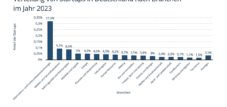Which Turkish industries have the greatest potential for successful expansion to Germany or Europe?
Xpert pre-release
Language selection 📢
Published on: March 26, 2025 / update from: March 26, 2025 - Author: Konrad Wolfenstein

Expansion instead of standstill: How Turkish companies conquer the European market - Image: Xpert.digital
Expansion instead of standstill: How Turkish companies conquer the European market (reading time: 24 min / no advertising / no paywall)
The Turkish economy is changing: challenges, opportunities and the view of Europe
The Turkish economy is in a phase of profound changes, characterized by remarkable dynamics, but also considerable challenges. For Turkish companies who are looking for growth and stability, the European market, especially Germany, is becoming increasingly important. For many, expansion beyond the national borders no longer only appears as an option, but as a strategic need to spread risks and open up new potential. But how exactly is the current economic situation in Turkey, and what opportunities and hurdles do Turkish companies expect on the way to Europe?
Suitable for:
A look at the current economic situation of Türkiye: between growth and instability
In order to understand the expansion efforts of Turkish companies, a closer look at the macroeconomic landscape of your home market is essential. The Turkish economy presents itself as a complex structure of impressive growth potential and persistent structural weaknesses.
Economic growth in the field of tension
In 2023, the Turkish economy showed considerable resistance with growth of gross domestic product (GDP) of around 4.5 to 5.1 percent, depending on the data source. This growth was followed by a recovery phase after the 2018 economic crisis and the global faults by Covid-19 pandemic. It reflected a robust internal demand, but some of them were fueled by an expansive fiscal and monetary policy. For the following years, however, all forecasts indicated a noticeable slowdown. For 2024, growth rates between around 2.7 and 3.5 percent were expected, with the actual growth in the range of around 3.2 percent leveled off. The expectations of the 3 percent mark are also in 2025. This expected weakening is not a sign of weakness per se, but rather a consequence of necessary macroeconomic stabilization measures. The Turkish government and the central bank are forced to contain the high inflation, which inevitably leads to a damping of internal demand. In this realignment, the focus is increasingly moving to an export -oriented growth model. This strategic change implies that Turkish companies will find it increasingly difficult to rely on domestic consumption exclusively for their expansion. The active exploration and development of international markets is therefore essential in order to maintain growth dynamics and to reduce dependence on the volatile home market.
Inflation: the persistent problem
Inflation remains the Achilles' heel of the Turkish economy. After an alarming maximum of the annual inflation rate of over 83 percent in autumn 2022, it declined, but remains at a level that causes considerable concerns. At the end of 2024, the rate was still 44 percent. In the spring of 2024, inflation even experienced a renewed increase to over 68 percent, the highest value since November 2022, before it dropped to just under 40 percent again in spring 2025. The Turkish Central Bank (CBRT) repeatedly had to correct its inflation forecasts upwards and now only expects a return to a reasonably moderate level of around 12 percent for 2026. This persistently high inflation has serious consequences: it erodes the purchasing power of the Turkish consumers, reduces the pensions and increases operating costs for companies due to increasing wages and more expensive advance payments. This creates a strong incentive for Turkish companies to look for markets with more stable price levels. Germany and the overall euro zone offer a much more predictable environment here, despite their own inflation challenges. The efforts of the European Central Bank (ECB) to moderate inflation in the euro area have contributed to a relative price stability that can offer Turkish companies a more reliable financial planning basis for their expansion.
Labor market: positive signals with reservations
There have recently been positive developments on the job market. The official unemployment rate dropped to 9.4 percent in 2023, after 10.4 percent in the previous year, and thus reached the lowest level in a decade. The quota even fell below the 9 percent mark at the end of 2023 and was around 8.4 percent in early 2025. A falling unemployment rate means that a larger part of the population is in wages and bread. In theory, this can lead to a larger range of available workers, potentially moderate wage costs and ensure that Turkish companies have sufficient staff to meet the production requirements of an expansion into the European market. However, the still high youth unemployment clouds this positive picture. It remains a significant challenge and indicates structural problems with the integration of young people into the labor market, which could be particularly relevant for industries that rely on young talents.
Exchange rate: the lira under pressure
The Turkish Lira has lost massive value in recent years to important international currencies such as the euro and the US dollar. The exchange rate EUR/TRY, for example, crossed the 41 lira per euro in spring 2025. The devaluation also continued to the dollar, with forecasts that suggest a course of over $ 45 per dollar by the end of 2025. This persistent devaluation of the Lira represents a double -edged situation for Turkish companies. On the one hand, it reduces Turkish products and services for buyers abroad, which can boost exports and increase the price competitiveness in European markets. On the other hand, it significantly increases the import of raw materials, machines, preliminary products and technologies that are not or not available in sufficient quality in Turkey. This increases the production costs and can Schmälern margins, especially for import -dependent industries. For companies that want to expand to Europe, this currency volatility requires extremely careful financial planning, sophisticated risk management and possibly the use of security strategies (hedging) in order to limit the negative effects of the exchange rate fluctuations.
The strengths of the Turkish economy as a foundation for expansion
Despite the challenges mentioned, the Turkish economy has a number of significant strengths that can serve as a solid basis for the international expansion of its companies:
Strategic location
The geographical position of Türkiye as a bridge between Europe and Asia is an invaluable advantage. It offers the close proximity to important European, Middle Eastern and Central Asian markets, which lowers transport costs and shortens delivery times - a decisive factor in globalized supply chains.
Diversified industrial structure
Turkey has built up an impressively wide and deep industrial basis. Strong know-how exists in numerous sectors such as automotive construction, textile and clothing industry, electronics production, mechanical engineering, chemistry and food processing. This diversification enables Turkish companies to offer a wide range of competitive goods for export.
Demographic advantage
With a young, dynamic and growing population, Turkey has a large reservoir of potential workers. Many young Turks are well trained and technology -savvy. Compared to Western Europe, labor costs are often even more competitive, which can mean a cost advantage in production.
Dynamic service sector
The tourism sector is traditionally an important support in the Turkish economy and contributes significantly to GDP (around 12 % in 2023). This success shows a well -developed service sector that also contains potential for expansion to related areas in Europe, for example in the hospitality, in logistics or financial services.
Focus on renewable energies
Turkey is increasingly investing in renewable energies that already make up over half of the installed electricity generation capacity. This focus on green technologies positions the country as a potential partner in the context of the European Energy transition (Green Deal) and opens up opportunities for Turkish companies in the field of energy generation, technology and services.
Established EU relationships (customs union)
The customs union with the European Union, which has existed since 1995, is a central pillar of economic relationships. It enables largely duty -free trade in industrial goods and has made market access to many Turkish products much easier. Even if it has a need for modernization and only partially covers certain sectors (such as agriculture and services), it offers an established framework for trade.
These strengths are not isolated phenomena, but have a synergetic effect. The strategic location makes it easier for the customs united by the customs union, the diversified industry delivers the exportable goods, and the young population provides workers for production. For many Turkish companies, the expansion to Europe is therefore a logical next step that builds on these solid foundations.
The weaknesses of the Turkish economy as a driver for internationalization
At the same time, it is precisely the weaknesses and structural problems of the Turkish economy that increase expansion pressure on companies:
Persistent inflation and instability
As already mentioned, the high inflation undermines domestic purchasing power and creates an uncertain economic environment that makes long -term planning difficult. The search for more stable markets with more predictable price developments is a need.
Import dependency
Turkey depends to a large extent on imports, especially in the case of energy (oil, gas) and technologically high -quality pre -performance goods and machines. This makes the economy susceptible to external price shocks and currency fluctuations and puts a strain on the trade balance.
Chronic current account deficit
The fact that Turkey tends to import more than exports more leads to a structural current account deficit. This deficit must be financed by capital inflows (investments or loans), which increases the dependency on abroad and exert additional pressure on the Lira.
Geopolitical risks
The situation in an unstable region (the Middle East, Black Sea region) harbors geopolitical risks that can affect investor trust and disrupt trade routes. This uncertainties can persuade companies to diversify their business geographically.
Political and regulatory uncertainty
Phases of political instability or unpredictable changes to the economic policy framework can deter foreign direct investments and make business planning difficult for domestic and foreign companies.
High foreign debt (private)
In particular, the short -term international debt of the private sector is susceptibility. In the case of global financial crises or a further devaluation of the Lira, the operation of these debts can become a significant problem.
These inherent weaknesses, especially inflation, currency volatility and import dependence, provide a convincing reason for Turkish companies to turn to the more stable and larger economic area of the European Union. Even if the EU market has its own challenges, the relative stability, the size of the internal market and the higher purchasing power offer resistance and growth perspectives that are currently difficult to find on the Turkish domestic market.
Suitable for:
- Turkish-German synergies for Turkish companies – Successful in Germany, the EU and worldwide – Expertise in business development, marketing and PR
Identification of potential sectors: where Turkish strength meets European demand
So which Turkish industries have the greatest potential for successful expansion to Europe, especially Germany? Here the competitive advantages of Turkish industries meet the specific demand of the European market.
Renewable energies and environmental technology
Driven by state incentives in Turkey and massive investments within the framework of the European Green Deal, there is enormous potential here. Turkish companies that work in the area of solar, wind or geothermal technology (the latter also interesting for agriculture) find a huge market in Europe. Cooperations, technology transfer and the export of components or entire systems are promising approaches.
Construction industry
Turkish construction companies enjoy a good reputation internationally and have extensive experiences with major projects abroad. In view of the need for infrastructure modernization, housing and energetic renovation in Germany and Europe, you can bring in your expertise and often competitive cost structures. The reconstruction of natural disasters in Turkey also strengthens the capacity and know-how of the industry.
Information technology (IT) and start-ups
Turkey, especially Istanbul, has developed into a living center for technology start-ups. Areas such as FinTech, e-commerce, gaming and software-as-a-service (SaaS) are booming and attracting risk capital. The European market, with its high digitization rate and demand for innovative solutions, is an attractive goal. The advanced legislation and the “passport porting” for financial service providers within the euro zone are additional incentives.
Automotive industry and supplier
As one of the cornerstones of the Turkish export industry, the automotive industry is already heavily integrated into European supply chains. Turkey is an important producer of commercial vehicles and cars as well as an important supplier of auto parts for European manufacturers, especially in Germany. The emerging focus on electromobility, symbolized by the domestic brand Togg, opens up new opportunities to participate in this global trend and to deliver components or know-how for the European EV market.
Agriculture and food industry
Turkey is an agricultural giant with considerable export potential, especially in the EU. The increasing demand for high -quality, natural, biological and sustainably produced foods in Europe plays Turkish providers in the cards. Products such as dried fruits (figs, apricots), nuts, tomato products, olive oil, legumes, but also flour and pasta find raging sales. The popularity of Mediterranean cuisine in Europe also fuels this demand.
Textile and clothing industry
Traditionally a strength of Türkiye, this sector benefits strongly from the customs union. Turkey supplies Europe with one of the largest textuals in the world with high -quality and competitive fashion, home textiles and technical textiles. The trend towards more sustainable fashion (“Slow Fashion”) offers new differentiation options.
Household appliances and consumer electronics
Turkish brands such as Beko and Vestel have developed a strong market position in Europe with high -quality and innovative products. This existing market share and brand awareness offer a solid basis for further growth and the introduction of new product lines.
mechanical engineering
The proportion of machines and systems on Turkish exports to the EU is growing steadily. Turkish manufacturers gain competence and can keep up with European competitors in certain niches and sub -sectors, often at more attractive prices.
Chemical industry
As an important contribution to the Turkish economy, this sector also offers potential for exports in the large European chemical market, be it with basic emications, plastics or special chemicals.
Defense industry
A relatively new, but rapidly growing sector with rising exports, also to Europe. In particular, drone technology, armored vehicles and naval equipment from Turkish production are paid to internationally. The current geopolitical climate could further increase demand.
These sectors not only show the economic dynamics of Türkiye, but also their ability to produce and innovate in areas that correspond closely with the needs of the European market and global megatrends such as digitization, sustainability and electromobility.
Our recommendation: 🌍 Limitless reach 🔗 Networked 🌐 Multilingual 💪 Strong sales: 💡 Authentic with strategy 🚀 Innovation meets 🧠 Intuition
At a time when a company's digital presence determines its success, the challenge is how to make this presence authentic, individual and far-reaching. Xpert.Digital offers an innovative solution that positions itself as an intersection between an industry hub, a blog and a brand ambassador. It combines the advantages of communication and sales channels in a single platform and enables publication in 18 different languages. The cooperation with partner portals and the possibility of publishing articles on Google News and a press distribution list with around 8,000 journalists and readers maximize the reach and visibility of the content. This represents an essential factor in external sales & marketing (SMarketing).
More about it here:
Why Turkish companies want to conquer the European market
The profile of Turkish companies willing to expand
The companies from Turkey that take the step to Europe are diverse. Nevertheless, some typical features and motivations can be seen:
Size and ripe
It is not just the big corporations. Small and medium -sized companies in particular (SMEs), the backbone of the Turkish economy, are increasingly looking for international growth opportunities. This includes both established medium -sized companies with many years of experience on the domestic market and young, technology -oriented “Born Global”, which are globally oriented from the start.
Industry focus
Naturally, many companies willing to expand come from the internationally competitive sectors (automobile, textile, food, electronics, mechanical engineering). However, innovative technology start-ups are increasingly urging the European market.
Core motivations
The main drivers are the search for new growth markets outside the volatile home market, the diversification of the sources of income for risk minimization, the use of the advantages of the customs union, access to a more powerful and stable consumer base and the pursuit of revenue in stable currencies such as the euro in order to counter and potentially higher profit margins.
Expansion strategies
The start is often via the classic export, which carries lower initial investments and risks. In the event of success, the establishment of your own sales offices or subsidiaries in strategically important markets such as Germany often follows in order to be closer to the customer. Strategic partnerships, joint ventures or even the takeover of established European companies are also considered as a means of accelerating the market, the acquisition of local expertise and the use of existing sales networks. Technology companies also often use remote working models and open up European talent pools.
It is crucial to understand that the profan -interested Turkish company is not monolithic. It ranges from traditional producing SMEs to agile tech start-up. Successful support from these companies therefore requires tailor -made strategies.
Germany: The strategic gate to Europe
For several reasons, Germany stands out as a particularly attractive location and strategic springboard for Turkish companies that want to expand to Europe:
Economic power and market size
Germany is by far the largest economy in Europe and one of the largest in the world. This means a huge internal market with high purchasing power and a pronounced demand for high quality products and services. Germany's economic stability offers a predictable environment.
Central location and logistics hub
Located in the heart of Europe, Germany borders nine countries and offers excellent transport connections to all important European markets. The outstanding infrastructure- thick motorway and rail networks, large international airports (such as Frankfurt) and important seaports (such as Hamburg and Bremen/Bremerhaven)- facilitates the efficient distribution of goods over the entire continent.
Political and legal stability
Germany offers a safe and predictable business environment, characterized by political stability, solid economic policy and a high degree of legal certainty. Transparent regulations and a reliable legal framework create trust for investors.
Qualified workers
The German education system, in particular the dual system of vocational training, produces highly qualified and motivated specialists, especially in technical and industrial areas. German engineering and production quality enjoy an excellent reputation worldwide.
Innovation ecosystem
Germany invests massively in research and development (F&E). Numerous renowned research institutes (e.g. Max-Planck, Fraunhofer), technology-oriented universities and innovative companies create a dynamic environment for technological progress and the development of new products and services. The high number of patent applications underlines this innovative strength.
Strong bilateral relationships with Türkiye
Germany is traditionally one of the most important trading partners in Türkiye and an important source of foreign direct investments. These deeply rooted economic relationships create a solid basis for further cooperations.
The Turkish diaspora
With over three million people of Turkish origin, the largest Turkish community lives outside of Türkiye in Germany. This diaspora represents an invaluable bridge. It facilitates cultural understanding, offers a network of potential employees, business partners and customers and can help Turkish companies to find their way in the German market faster.
The combination of economic strength, strategic location, excellent infrastructure, stability, innovative strength and special relationships with Turkey makes Germany an almost ideal starting point for Turkish companies who want to conquer the European market.
The indispensable role of a German partner
Entry into a highly developed and competitive market like Germany is complex for foreign companies. Cultural differences, language barriers, unknown regulatory requirements and dense competition represent considerable hurdles. Here the decisive role of a local German partner comes into play that specializes in marketing, PR and business development:
Local market know-how
A German partner has profound knowledge of consumption behavior, market trends, the competitive landscape and industry -specific peculiarities. He knows the most effective marketing channels and PR strategies to achieve the German target group.
Cultural translation
He can adapt marketing messages and communication strategies to German cultural values and communication styles in order to avoid misunderstandings and build trust. Native language skills are essential for smooth communication with partners, customers and the media.
Networks and contacts
An established partner brings a valuable network of media contacts, industry influencers, potential sales partners, dealers and other relevant actors. These contacts can open doors, generate leads and enable strategic cooperation.
Navigation through regulations
The partner knows the German and European business provisions, industrial standards and legal framework conditions. He can support the company's foundation, compliance with regulations (compliance) and to cope with bureaucratic processes and thus help avoid costly mistakes.
Tailor -made business development
Based on its market knowledge, he can develop tailor-made market entry and growth strategies, identify lucrative business opportunities and support them in the initiation of partnerships or joint ventures.
Risk -terminimization
Through anticipation of potential challenges - be it cultural pitfalls, market entry barriers or competitive pressure - the partner helps to proactively manage and minimize risks.
A specialized German partner therefore acts as an indispensable bridge and catalyst. He provides local knowledge, cultural competence, contacts and strategic expertise that Turkish companies need to accelerate the market entry, reduce risks and achieve sustainable growth in Germany and Europe.
Learning from the successful: Examples of Turkish companies in Europe
The fact that Turkish companies in Europe and especially in Germany can be successful show numerous examples from different industries:
Gastronomy and food
The Berlin restaurant chain Hasir, founded in 1978, grew to an empire with numerous restaurants and hotels. Companies like Marmara GmbH have established themselves as important importers and distributors of Turkish food and show the continued demand. The takeover of the British biscuit manufacturer United Biscuits by the Turkish ülker group (today Pladis) made it a global heavyweight with a strong European presence.
technology
The video game development studio Crytek, founded by Turkish -born brothers in Germany and headquartered in Frankfurt, celebrated world successes with games like Far Cry and Crysis. Kobil Systems, also founded by a Turkish immigrant in Germany, is now a leading provider of security technology for online banking with well-known European banks as customers. Younger “Unicorns” such as the GETIR delivery service or the e-commerce platform Trendyol are aggressively expanding into European markets and demonstrating the scalability of Tech-Tech models.
Industry and services
Companies like Extim GmbH specifically promote cooperation between German and Turkish companies, especially in the automotive supply industry. Solitem, founded by a Turkish engineer in Germany, develops innovative solar -powered cooling systems. Turkish-born entrepreneurs have also built up successful companies in the logistics (e.g. Tunc Trans) or service sector (e.g. the cleaning company Forever Clean).
These diverse success stories show that Turkish companies - whether large or small, whether founded by immigrants or expanded from Turkey - have the potential to prevail in the demanding German market. Key factors are often high quality, adaptability to local needs, the use of bilateral relationships and the entrepreneurial spirit, often supported by the Turkish diaspora. They provide valuable blueprints and inspiration for other companies willing to expand.
Mastering challenges: Risks and approaches to European expansion
However, the way to Europe is not free from obstacles. Turkish companies have to adapt to specific challenges and develop strategies for coping with them:
Limits of customs union
The EU-Türkiye customs union does not cover services, agricultural products (only partially) and public orders. In addition, Turkey does not have a say in EU-free trade agreements with third countries, which can lead to competitive disadvantages. Solution: Focus initially on covered industrial goods, examination of EU branches or partnerships for other sectors, observation of modernization talks on the customs union.
Regulatory hurdles and compliance
Compliance with complex EU standards, standards (e.g. product safety CE marking, environmental requirements) and certifications can be complex and expensive. The upcoming EU-CO2 border compensation mechanism (CBAM) will additionally burden imports from CO2-intensive industries. Solution: Thorough research, involvement of specialized consultants, investment in product adjustment and certification, early analysis of your own CO2 footprint and development of decarbonization strategies.
Cultural differences in business life
Different communication styles (directly vs. indirect), different importance of personal relationships, punctuality and decision -making processes can lead to misunderstandings. Solution: Intercultural training for employees, awareness of German business labels, step -by -step trust build, use of a German partner as a cultural mediator.
Language barriers
Even if English is widespread, good knowledge of German for marketing, customer care and building trust are essential. Solution: Professional translation and localization of materials, attitude of German -speaking employees for key positions.
Intensive competition
The European market is saturated and hard -fought. Solution: Clear positioning through quality, innovation or price, identification of niche markets, building a strong brand.
Exchange rate fluctuations
The volatility of the Lira remains a risk of financial planning and profitability. Solution: Use of financial security instruments, price calculation in euros, management of euro accounts.
Geopolitical and economic uncertainties
Global crises or tensions in the EU-Turkey relationships can affect the business environment. Solution: Robust risk management plans, geographical diversification within Europe, continuous observation of the political and economic situation.
A proactive approach to identifying and coping with these risks, ideally in cooperation with an experienced local partner, is crucial for sustainable success.
Strategic recommendations for success in Europe: a timetable
Based on the analysis, the following strategic recommendations for Turkish companies can be derived that strive for an expansion to Germany and Europe:
- Thorough market analysis: Invest the time and resources to understand the target market (Germany and possibly other European countries) exactly - customer needs, competitors, sales channels, regulatory requirements.
- Focus on core competencies: focus on sectors in which your company and Turkey have been shown to strengthen strengths and competitive advantages and where there is a clear demand in Europe.
- Tailor -made entrance strategy: Choose the right market entry mode (export, establishment, partnership, acquisition) based on your resources, goals and your risk of risk.
- Find strategic German partners: Active for a reputable German partner with expertise in marketing, PR and business development that knows your industry and has experience with international companies. Pay attention to intercultural competence.
- Invest in culture and language: train your employees intercultural and invest in German skills for key personnel. Carefully locate your communication.
- Ensure compliance: Plan sufficient resources to meet all EU and German regulations and standards. Get external advice if necessary.
- Build brand presence: Develop a clear, culturally adapted brand message and invest specifically in marketing and PR to build up awareness and trust.
- Establish efficient logistics: ensure reliable and cost -effective supply chains and logistics processes for the European market.
- Stay flexible and learn: continuously monitor your performance, collect feedback and be ready to adapt your strategies. The market entry is a learning process.
- Use bilateral bridges: build on the strong economic and social connections between Turkey and Germany. Use the Turkish diaspora network.
A way with potential and challenges
The expansion to Europe, especially Germany, offers immense opportunities for Turkish companies to escape the volatile home market, to open up new growth potential and to secure their competitiveness in the long term. The strengths of the Turkish economy in many sectors affect a high demand in a stable and powerful market. Germany acts as an ideal gate and strategic anchor point.
At the same time, the path is not without challenges. Regulatory hurdles, cultural differences, intensive competition and economic uncertainties require careful planning, a clever strategy and often support from an experienced local partner. However, companies that are willing to accept these challenges, do thorough work and react flexibly to the circumstances of the European market have excellent prospects of continuing their success story beyond the Turkish borders. For many Turkish companies, the view of Europe is not just an option, but a promising path into a more stable and growing future.
Our recommendation: 🌍 Limitless reach 🔗 Networked 🌐 Multilingual 💪 Strong sales: 💡 Authentic with strategy 🚀 Innovation meets 🧠 Intuition
At a time when a company's digital presence determines its success, the challenge is how to make this presence authentic, individual and far-reaching. Xpert.Digital offers an innovative solution that positions itself as an intersection between an industry hub, a blog and a brand ambassador. It combines the advantages of communication and sales channels in a single platform and enables publication in 18 different languages. The cooperation with partner portals and the possibility of publishing articles on Google News and a press distribution list with around 8,000 journalists and readers maximize the reach and visibility of the content. This represents an essential factor in external sales & marketing (SMarketing).
More about it here:
We are there for you - advice - planning - implementation - project management
☑️ SME support in strategy, consulting, planning and implementation
☑️ Creation or realignment of the digital strategy and digitalization
☑️ Expansion and optimization of international sales processes
☑️ Global & Digital B2B trading platforms
☑️ Pioneer Business Development
I would be happy to serve as your personal advisor.
You can contact me by filling out the contact form below or simply call me on +49 89 89 674 804 (Munich) .
I'm looking forward to our joint project.
Xpert.Digital - Konrad Wolfenstein
Xpert.Digital is a hub for industry with a focus on digitalization, mechanical engineering, logistics/intralogistics and photovoltaics.
With our 360° business development solution, we support well-known companies from new business to after sales.
Market intelligence, smarketing, marketing automation, content development, PR, mail campaigns, personalized social media and lead nurturing are part of our digital tools.
You can find out more at: www.xpert.digital - www.xpert.solar - www.xpert.plus





























